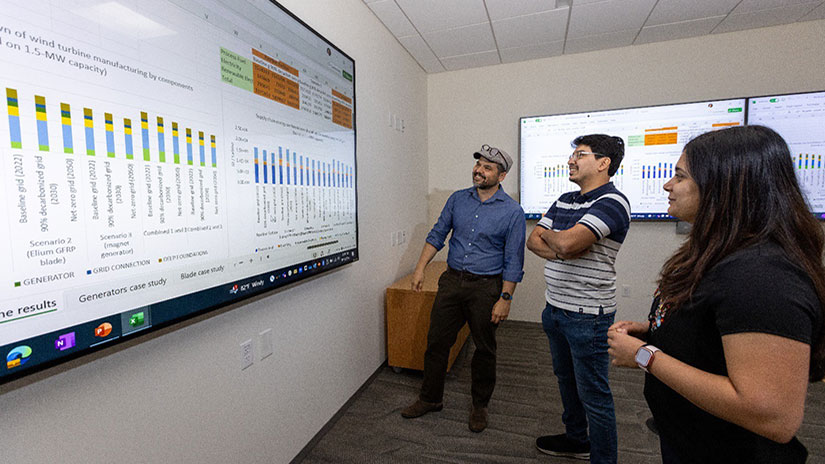Materials Flows through Industry Supply Chain Modeling Tool
NLR's Materials Flows through Industry (MFI) modeling tool tracks the material and energy demands from manufacturing supply chains.

NLR’s Guilherme Castelao, Shubhankar Upasani, and Swaroop Atnoorkar look at data from the Materials Flows through Industry (MFI) modeling tool. This software tracks the material and energy demands from manufacturing supply chains. Photo by Agata Bogucka, National Laboratory of the Rockies
Manufacturing is central to our nation's economy, and the U.S. manufacturing sector is continually evolving as new technologies and materials are developed.
To keep up with industry advancements, NLR developed the MFI tool, which models U.S. industrial sector supply chains. From evaluating energy and materials inputs in the initial manufacturing stages to those of the final production stages, this tool informs the manufacturing process from resource extraction ("cradle") to the factory gate.
The tool is a linear network model of the U.S. industrial sector. It can model a range of manufacturing scenarios, including the effects of changes in production technology and increases in industrial energy efficiency. The tool performs supply chain analyses to quantify the impacts and benefits of next-generation technologies and materials at that scale.
NLR has enhanced several features of the tool. For instance, researchers added a sensitivity analysis module to the internal MFI codebase, making it easier to collaborate on NLR's techno-economic analysis projects.
Another update to the internal model has refreshed the calculation of transportation sector impacts in supply chains, using the most recent update of the Commodity Flow Survey. In addition, the internal MFI codebase can track critical materials used in the supply chain investigated, making the MFI tool especially relevant for understanding material trade-offs of emerging technologies. All updates will be included in the MFI web app in a future update.
Additional, targeted improvements include:
- Adding data for biobased inputs
- Integrating additive manufacturing data into the MFI tool
- Developing models to evaluate material and resource efficiency and recycling strategies
- Developing an exportable data set to utilize in external life cycle assessment tools
- Representation of global production technologies to enable comparison to U.S. domestic manufacturing
- Adding capability for batch processing of multiple supply chain scenarios to enable comprehensive comparative analyses across multiple products and technology options.
Application
A version of the tool is available for use by members of industry, academia, and the research community, as well as the general public. To access the tool and provide feedback, simply request an account.
The MFI tool was developed with support from the U.S. Department of Energy's Industrial Technologies Office's strategic analysis team.
NLR released version 3.3.2 of the MFI public-facing web application, with several cosmetic upgrades to improve user-experience and functionality.
Impact
Next-generation technologies may be more energy intensive than current technologies. However, they have the potential for reduced material and energy consumption in upstream or downstream processing stages. Use of the MFI tool will help manufacturers evaluate this potential, leading them to fully understand the benefits and consequences of technology deployment.
Capabilities
Learn more about NLR's manufacturing analysis capabilities.
Publications
Techno-Economic, Life-Cycle, and Socioeconomic Impact Analysis of Enzymatic Recycling of Poly(ethylene Terephthalate), Joule (2021)
Evaluating Opportunities To Improve Material and Energy Impacts in Commodity Supply Chains, Environment Systems and Decisions (2017)
Contact
Share
Last Updated Jan. 15, 2026
